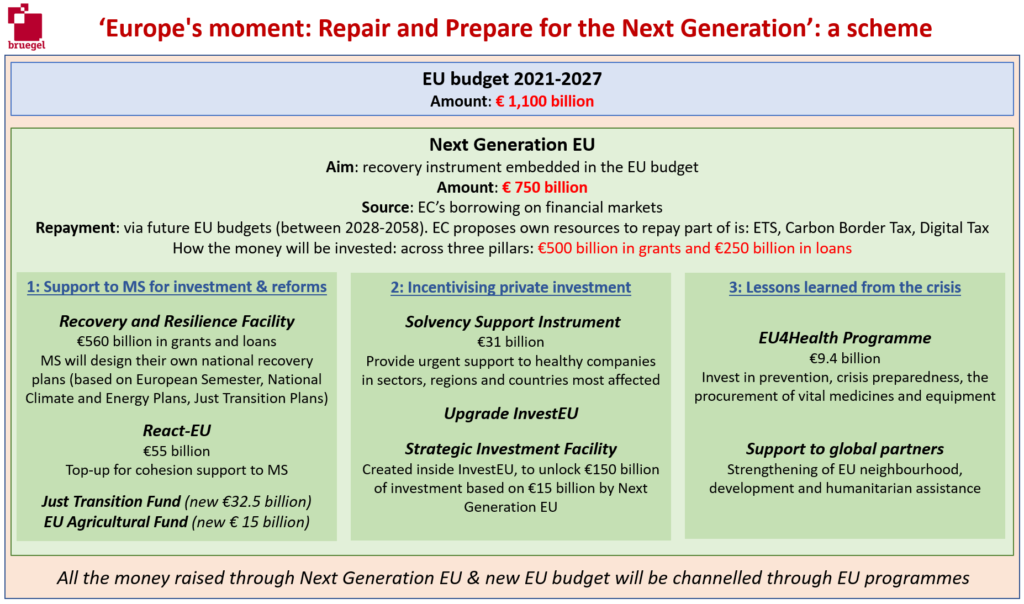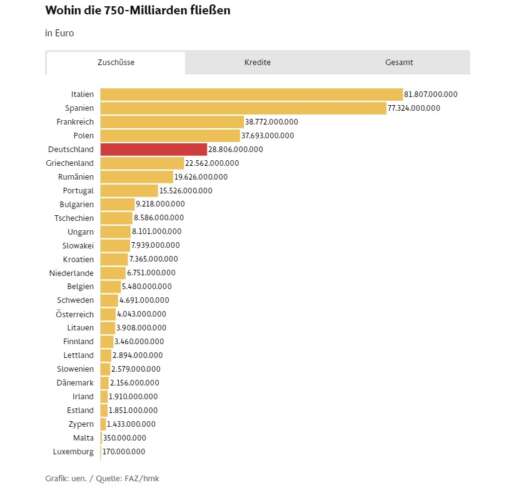
Ursula von der Leyen, president of the European Commission presented yesterday, in the European Parliament, the European Commission’s proposal for an ambitious Recovery Plan for Europe.
The Plan is based on two main pillars:
- the “Next Generation EU” instrument of 750 billion euro
- an increased EU budget of 1 100 billion EUR in-between 2021-2027.

The communication by the European Commission declares the social economy as one of the sectors touched most by the current crisis, together with the cultural and tourism sector.
At the same time, the social economy is considered an important instrument helping in particular the most vulnerable persons to find their way out of the crisis and into employment.
Also, the Commission underlines solidarity between people, generations, regions and countries as a main element and principle for recovery.
The Commission communication sets out proposals with a list of concrete measures to support recovery in Europe.
- A Recovery and Resilience Facility ( 560 billion euro) to be implemented in the framework of the European semester and based on national recovery plans – will provide support for investments and reforms in the different Member States based on grants and loans.
- Through the new programme REACT-EU (‘Recovery assistance for cohesion and the territories of Europe’) (55 Bilion euro), for example, the Commission proposes to feed, until 2022, additional 55 billion EUR into ongoing cohesion policy programmes. Main criterium for the allocation of this funding is socio-economic impact of the crisis in the different territories, including elements such as youth unemployment. Also the relative prosperity of Member States will be taken into account.The revised proposal for Cohesion Policy provides for greater flexibility for transfers between funds in order to better support local and regional authorities.
- According to the proposal of the European Commission, initiatives such as a new Solvency Support Instrument and a strengthened InvestEU initiative should help companies to overcome the crisis through a mobilization of additional private investments.
- Green Transition should be fostered for example through the reinforcement of the Just Transition Fund and a strengthened European Agricultural Fund for Rural Development.
- The Commission proposal also foresees a new Health Programme (EU4Health) reinforcing health security within the EU and preparing for possible future health crises.
- Following the Commission proposal, also other programmes, such as Horizon Europe, the Humanitarian Aid Instrument or Digital Europe, should be strengthened.
The adjusted work programme 2020 of the European Commission foresees the continuation and expansion of different initiatives taken recently to support companies and employment. Examples are the SURE (Support Mitigating Unemployment Risks in Emergency) programme, reinforced measures against youth unemployment, the promotion of fair minimum wages or initiatives to strengthen equal opportunities (including pay transparency measures). Emphasis will also be put on the circular economy, safe and sustainable food or biodiversity.
New resources, increased EU budget
To finance the measures proposed, the European Commission suggests
- lifting the own resources ceiling to 2% of EU Gross National Income.
- The increased EU budget will then enable the Commission to take up 750 billion EUR of credit on financial markets. These funds would then be paid back gradually, in-between 2028 and 2058 through the EU budget, including possibly new own resources (which could be based, for example, to a digital tax, operations of large companies or the Emissions Trading Scheme). The European Commission also plans to support Member States in fighting tax evasion.

Multi-Annual Financial Framework (EU Budget 2021-2027)
The Multi-Annual Financial Framework (EU Budget) 2021-2027, with 1,1 trillion euro, a specific Own Resources Decision and a Revised Multiannual Financial Framework 2014-2020 will now be negotiated with and in the European Parliament and the European Council. The objective is to have the revised MFF 2014-2020 adopted in early autumn 2020, the MFF 2021-2027 and the Own Resources Decision in December 2020.
This health and economic crisis we face is unprecedented in the history of the EU. The solution for the Commission to borrow money from the market is a remarkable one, a European solution for a European problem. The crisis is a game changer.
